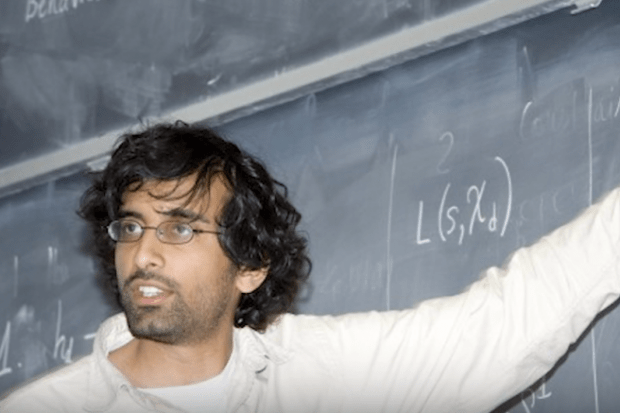An Australian mathematics prodigy is among four winners of the discipline’s equivalent of an Olympic gold medal, being named a Fields Medal recipient at the International Congress of Mathematics.
Akshay Venkatesh, currently a maths professor at Stanford University, was one of four people to claim the Fields – considered the discipline’s Nobel Prize – at the congress, which started in Rio de Janeiro on 1 August.
The other winners were Alessio Figalli of ETH Zurich, the University of Cambridge’s Caucher Birkar and Peter Scholze of the University of Bonn.
The medal, which is funded by a trust established by Canadian mathematician John Charles Fields, recognises stellar performers who still have a lot to give. It is awarded every four years to up to four mathematicians aged under 40.
Professor Venkatesh is just the second Australian to claim the honour after Adelaide-born Terry Tao won the Fields in 2006. It caps a good week for Antipodean mathematics after the University of Sydney’s Nalini Joshi was elected vice-president of the International Mathematical Union at its general assembly in Sao Paulo – the first Australian to attain such a position.
Professor Venkatesh was recognised for “his synthesis of analytic number theory, homogeneous dynamics, topology and representation theory”. An aficionado of number theory, he described his craft as a delightful frustration. “I’m looking for new patterns in the arithmetic of numbers,” he said.
“A lot of the time you’re stuck, but at the same time there are all these moments where you feel privileged. You have this sensation of transcendence – you feel like you’ve been part of something really meaningful.”
Born in New Delhi and raised in Perth, Professor Venkatesh displayed an astonishing capacity for maths at a very early age. He won medals at both the international physics and mathematics olympiads when he was 12 and completed his secondary schooling the same year.
He became the University of Western Australia’s youngest ever graduate in 1997, earning a first-class honours in mathematics and physics at the tender age of 16. He obtained a PhD at Princeton University five years later.
Cheryl Praeger, now an honorary researcher at UWA, first encountered him as a child during a meeting with his mother. “My blackboard contained fragments from a supervision of one of my PhD students, just completed. I found that he could easily grasp the essence of the research.”
This year he plans a return to Princeton to take up a post at the Institute for Advanced Study, where he has held a visiting role.
Register to continue
Why register?
- Registration is free and only takes a moment
- Once registered, you can read 3 articles a month
- Sign up for our newsletter
Subscribe
Or subscribe for unlimited access to:
- Unlimited access to news, views, insights & reviews
- Digital editions
- Digital access to THE’s university and college rankings analysis
Already registered or a current subscriber? Login






